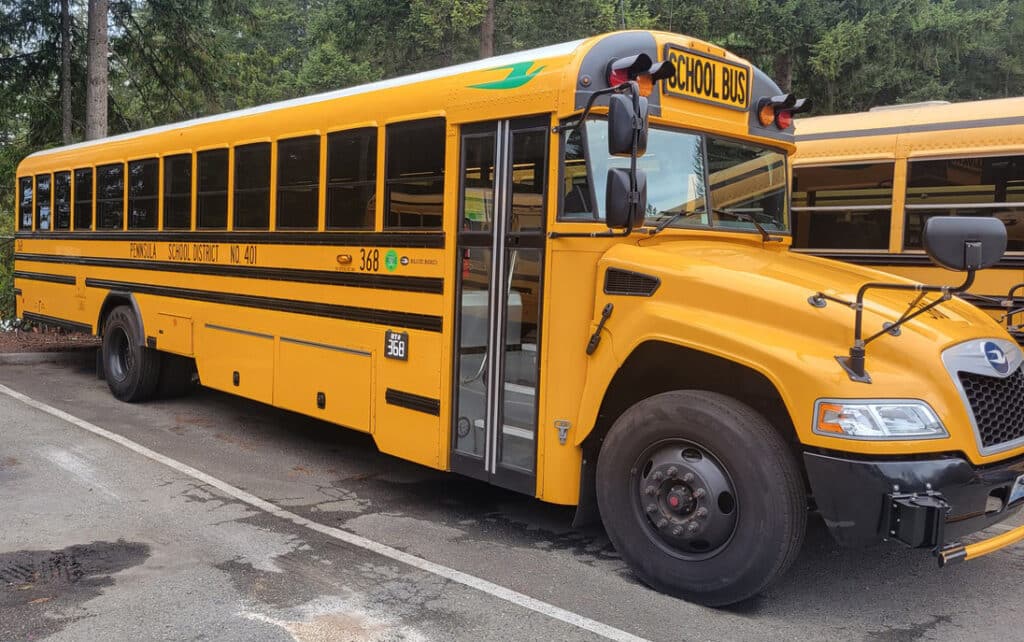Community Education Environment
EPA grant helps school district buy more propane buses
Peninsula School District is one of 16 districts in Washington state to receive money for clean school buses in the most recent round of federal funding from the EPA’s Clean School Bus Program, part of the Bipartisan Infrastructure Law.
Education Sponsor
Education stories are made possible in part by Tacoma Community College, a proud sponsor of Gig Harbor Now.
Peninsula’s $250,000 in rebate funding will help offset the purchase 10 new propane buses to replace diesel buses as part of the district’s routine bus replacement plan.
The Clean School Bus Program provides $5 billion over five years (2022-2026) for clean upgrades to the nation’s school bus fleet. The new buses will be either zero or low-emission vehicles. The EPA has awarded nearly $3 billion in grants and rebates to help replace approximately 8,500 buses nationwide, according to the EPA.
The district’s bus replacement cycle is funded by the state. Propane buses cost about $180,000 each, according to Ashley Murphy, Peninsula’s chief of finance and operations. The $250,000 from the EPA amounts to about 14% of the $1.8 million Peninsula is spending on the new buses.

Peninsula School District in August 2023 installed infrastructure for propane buses and added four propane buses to its fleet. Now, with a federal rebate from the Bipartisan Infrastructure Act, it will add 10 more buses over the next two years. The district will receive $250,000 from the EPA’s Clean School Bus Program to offset the cost of the new propane buses, about $180,000 each. Courtesy Peninsula School District
“These are costs we would have been incurring regardless,” Murphy said. “So, the $250,000 is just money in our pocket.”
Peninsula will purchase five new buses this year and five next year, with rebates from the first five helping offset the cost of the next five.
Districts receiving rebates
The 16 districts in Washington receiving rebates share more than $24 million in the current round of funding, according to a news release from Sen. Patty Murray, who was instrumental in helping pass legislation leading to the clean bus program. The districts will replace 111 buses with either electric or propane vehicles.
“Clean school buses are huge improvement over diesel buses,” said Murray, D-Wash. “They’re better for the environment, better for public health, they save school districts money on fuel and we’re building them here in America, which is why I worked so hard to get my bill passed as part of the Bipartisan Infrastructure Law.”
The 16 districts ranged from two of the largest — Seattle and Spokane — to small, rural districts like Sultan and Republic. Awards ranged from $75,000 (Oak Harbor, toward the purchase of three propane buses) to $9.1 million (Spokane, toward the purchase of 25 electric buses).
Cost and environmental benefits
“This is a significant milestone for our district, bringing numerous benefits to our students, community and environment,” said Peninsula’s Transportation Director Dawnett Wright. “By replacing 10 of our current diesel buses with new propane-powered ones, we will significantly reduce our carbon footprint and operational costs while ensuring that our transportation fleet remains robust and reliable.”
Lower emissions from propane buses, compared to diesel, mean health benefits from cleaner air to students, drivers and the community, according to the EPA.
“Eventually, the district plans to add electric buses to our fleet, but propane is the perfect bridge that allows us to lower our carbon footprint with technology that works for our district in this moment.”
Propane versus electric buses
Districts seeking Clean School Bus Program rebates had to choose either electric or propane vehicles. Most of the 16 districts opted for electric buses. Peninsula was one of five that went with propane.
The district was already on a path to convert its fleet to propane-powered vehicles. In August 2023, Peninsula installed infrastructure for propane buses and added four propane vehicles to its fleet.
Propane buses are more affordable than electric buses, comparable to the cost of diesel buses. They are also reliable for the district’s daily transportation needs, including longer routes, Wright said.
Electric buses have limited range that wouldn’t work well for Peninsula School District, which has long routes, many constrained by bodies of water.
Unlike electric vehicles, which have reduced performance in cold temperatures, propane buses can handle extreme weather and are capable of starting in temperatures as low as minus 40 degrees, Wright said.

